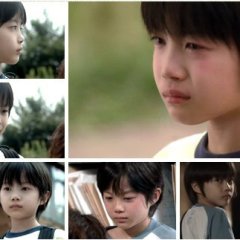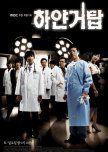Sora, the third of four sisters, inherits from her father Sakamoto Medical Practice in Kabukicho, Shinjuku. Sora sees even those with no money and the waiting room is always crowded with penniless patients. Keeping the indebted surgery going is tough but Sora manages to carry on with a smile and becomes a popular figure in the neighborhood. The oldest sister, Umi, is a single doctor researching gene therapy. The second sister, Riku, is the wife of the owner of a large hospital. The fourth sister, Mimi, is a trainee doctor dreaming of becoming famous. The four of them have very different stances on what it means to be a doctor, assuring that every gathering results in a fraternal fight. One day, Umi calls the four sisters together and introduces them to a young girl they have never seen before. It turns out to be Hiyo their heretofore unknown half-sister from Hokkaido. Hiyo is very sick, her body being invaded by a heavy illness. (Source: DramaWiki) Edit Translation
- English
- magyar / magyar nyelv
- dansk
- Norsk
- Native Title: マリア
- Also Known As: Mariya , 医家姐妹 (2001)
- Director: Hoshida Yoshiko, Takahashi Nobuyuki
- Screenwriter: Hashimoto Hiroshi, Suzuki Katsuhide
- Genres: Drama, Family, Medical
Cast & Credits
- Asano Atsuko Main Role
- Okae Kumiko Main Role
- Kikukawa Rei Main Role
- Goto Maki Main Role
- Kishi KeikoSakamoto UmiSupport Role
- Azuma MikihisaSakamoto AkiraSupport Role
Reviews

An excellent drama about sisterly love and loyalty!
I thought this series was genuinely moving and had a great overall message! The story basically centers around sibling relationships, and what it means to be there for one another when you have nobody else to turn to. Though I was a little disappointed with the limited characterization of all the sisters but Sora (each were given roles that amounted to little more than "wise older sister" or "spoiled youngest daughter," for example), by the end the characters just grew to be so likable that I had the impression they were better written than they actually were. Most of the show's focus is on Sora, and it employs a fragmented format where every episode, she helps one patient come to terms with their illness or a problem they may have. Unfortunately, this means that major plot points like Hiyu's illness sometimes feel like afterthoughts due to how little time is devoted to them, though luckily, they never get (too) mawkish or heavy handed to try to compensate (in fact, possibly 80% or more of the show has a humorous tone). I'm just sad that the whole thing didn't last a few episodes more; I loved the final episode and the ending, but they just came too soon!Needs to be a longer remake or k-drama
It's an okay show but it could've been better, you will get attached to the main cast but wish they had more screen time other than the protagonist, so much so that you sometimes forget the deuteragonist(who also happens to be the drama's narrator) even existed. If you're expecting any medical action then lower your expectations cause there isn't that much because it focuses more on the relationships between the doctor and her patients than solving medical cases, in fact the episodes that had any resolution medical-wise are the first episode and the 7th episode that guest star Ryunosuke Kamiki who is the only reason I even watched this drama lol. This should've been longer like at least a 16-20 episodes long K-drama kinda wish that they remade this show because it had so much potential.





















































